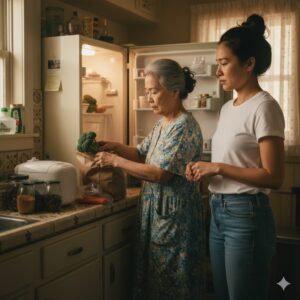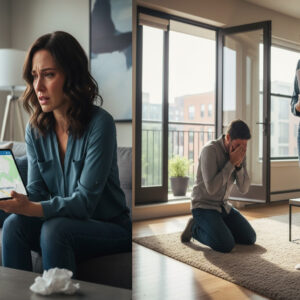The Retirees Who Squandered Their Own Homes
I don’t even know where to begin this story. My name is Rosa, I’m seventy-three years old, and I never thought that at my age I’d become… well, a squatter in my own home.
It all started six months ago when my husband, Héctor, and I fell victim to a real estate scam. We had decided to sell our little house in our old neighborhood to move to something smaller and save some money for our later years. A very well-dressed man, with papers that looked legitimate and a smile that gave us confidence, convinced us to sign some documents. He told us it was part of the process, that the money would arrive in a week.
It never arrived. When we tried to complain, we discovered he had sold our house to a third party and disappeared with our savings from a lifetime of work.
“What are we going to do now, Rosa?” Héctor asked me every night, with that vacant look in his eyes that broke my heart. Our pension isn’t even enough for a decent rent, and our children live far away, with their own families and problems.
That’s when I made the most desperate decision of my life.
“Héctor,” I said one morning, “let’s go back home.”
“But Rosa, it’s not ours anymore…”
“It was ours for forty years. That woman who bought it can wait. We don’t have time or anywhere to go.”
And that’s how we became squatters in our own house. We waited for the new owner to leave and entered through the back window, the one that always closed poorly and that Héctor never bothered to fix. How ironic.
The first few days were terrible. We had no electricity, no gas, no water. Héctor cried silently, ashamed. I tried to stay strong, but inside I was dying of humiliation. At our age, living like criminals in our own house.
We were afraid to go out. What if they saw us? What if they called the police? We were locked inside, eating the little we’d brought in a bag. By the third day, we had nothing left.
That’s when bags of food started appearing at the back door. Bread, milk, some fruit, canned goods. At first, we thought it was a neighbor who had noticed our situation, but we didn’t dare ask.
“Someone knows we’re here, Rosa,” Hector told me, worried.
“But they’re helping us, not ratting us out,” I replied, although I also had my doubts.
This continued for weeks. Every two or three days, fresh food would appear. We welcomed it like a miracle, like manna from heaven. Hector had regained some color in his cheeks, and I could sleep a little better knowing we weren’t going to starve to death.
Until one day, someone knocked on the door.
My heart stopped. Hector hid in the bedroom. I froze in the hallway. The knocking continued, soft but insistent.
“Mrs. Rosa,” I heard a female voice from outside. “I know you’re there. Please open the door.”
There was no escape. With my legs shaking, I opened the door.
There she was: a woman in her forties, brunette, wearing simple clothes, carrying a shopping bag. The new owner of my house. The one who had been leaving us food without our knowledge.
The moment our eyes met, I couldn’t hold it back any longer. Forty years of pain, humiliation, and injustice came crashing down on me. I burst into tears like a child.
“I’m sorry,” I said between sobs. “I’m sorry, I’m sorry, I’m sorry. I know this is wrong, but we have nowhere else to go. They scammed us, they stole everything from us. This was our home. We lived here for forty years. Forty years…”
The woman put the bag on the floor and took my hands.
“Mrs. Rosa, I know the whole story. When I bought the house, I did my own research because the low price seemed strange to me. I found out what happened to them.”
“And why didn’t you kick us out? Why did you leave us food?”
“Because I have a mother her age, and because what they did to you is a terrible injustice. But also because this house needs people to care for it, to love it. I work all day, I don’t have a family, I live alone. This house is too big for me.”
I wiped my tears, not quite understanding where the conversation was going.
“Mrs. Rosa, I have a proposal. I need someone to take care of the house, and you need a place to live. What do you think if we make a plan? You can stay here, and you’ll pay for the house little by little, with very comfortable installments, whatever you can afford with your retirement. No rush, no exorbitant interest. When you can, when you want.”
I couldn’t believe what I was hearing.
“But ma’am… I don’t even know your name.”
“Marcela. And it’s not charity, Mrs. Rosa. It’s justice. This house has to belong to you again, as it should.”
Héctor appeared behind me, also with tears in his eyes.
“Are you serious?” she asked, her voice cracking.
“I am serious,” Marcela replied with a smile. “We’re going to do things right, with the paperwork, with everything legal. But in the meantime, let’s turn on the electricity and gas. This house has to be a home again.”
That night, months later, we slept in our bed, in our house, with light and heat. But above all, we slept with hope.
There are good people in this world, after all. And sometimes, when all seems lost, a guardian angel appears with a name and surname to remind us that humanity still exists.
Marcela didn’t just give us back our house. She gave us back our dignity.
News
Marrying a rich disabled husband to pay off debt to “save” her father, she was looked down upon by her husband’s family for 7 years. One day, he stood up and walked. His first words left the whole family speechless./hi
Marrying a rich disabled husband to pay off her father’s debt, she was despised by her husband’s family for 7 years, until one day he stood up and walked, his first words left the whole family speechless Seven years ago,…
Every week my mother-in-law comes to my house 3 to 4 times, every time she cleans out the refrigerator, gathering all the food for her sister-in-law. Too dissatisfied, I quietly put something in the refrigerator that makes her tremble with fear./hi
Every week, my mother-in-law would come to my house three or four times, and every time she would clean out the refrigerator and take all the food for her sister-in-law. I was so dissatisfied that I quietly put something in…
A Punch. A Pause. And Then? They Realized the New Girl Wasn’t Who They Thought./hi
Bullies Punched a New Black Girl in The Face — Big Mistake… They Had No Clue Who She Really Was The Morning It All Began It was supposed to be just another Tuesday at Westbridge High, a suburban school known for…
One unplanned visit to his maid’s house — one door opened — and a truth powerful enough to shatter his beliefs forever./hi
Without warning, the millionaire decided to visit his maid’s house. He never imagined that by opening that door he would discover a secret capable of changing his life forever. One Thursday morning, with the golden sunlight filtering through the leaves…
My husband said he was on a business trip for 3 days, but the location showed he was at the maternity hospital. I didn’t make a fuss — just quietly did 3 things, causing his life to fall into the abyss of humiliation./hi
My husband said he was going on a business trip for 3 days, but the location showed he was at the maternity hospital. I didn’t make a fuss — just quietly did 3 things, causing his life to fall into…
To legitimize the pregnancy, I agreed to marry a worker. But when my daughter turned three, I was stunned to find something in my husband’s wallet – and then, I understood why he had agreed to marry me all those years ago./hi
To legitimize the pregnancy, I agreed to marry a factory worker. But when my daughter turned three, I was stunned to find something in my husband’s wallet – and then, I understood why he had agreed to marry me. My…
End of content
No more pages to load











